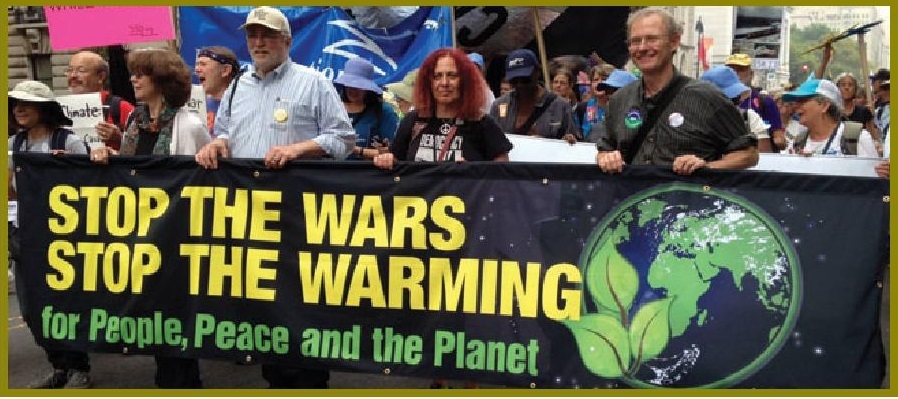War-fairs…peace by peace
09 Oct 2024 11:49:43


By Biraj Dixit :

“This is a war to end all wars.”
American President Wood row Wilson
had declared this in 1917, justifying
decision to join the First World War. A
wartoendallwars…anew beginning…
a new world. Moved by the same emotion, the leaders of that time formed
the League of Nations. But soon
enough, theworldwasready for another war, and another, and another. To
this day, the desire for a new world free
of war has never really gained any
ground.For,the groundis fullofweeds.
Weeds can spread far and widein no
time.Weeds eat-up allnutrients essential forplantlife and as a consequence,
all life. A village farmer (not initiated
into the crude sophistication of the
world)could tell thatonecannotprune
weeds. They are to be removed completely or else they grow again fast and
in no time consume everything. Yet,
suchis our collective folly thatwe keep
pruning the weed in show of great solidarity for mankind. Historians of the
pastsay thatseedsof thewar-weedwere
carelessly allowed to remain in the
ground (sometimes even carefully
placed) in many a peace treaty. And
thanks to these effortsof keepingpeace
on very unsteady ground, world peace
has remained an illusion.
A war to end
all wars was never ‘this one’.
The League failed but it left behind
anidea. Anidea of a place where countries of the world can come, sit, talk,
discuss, debate before they take up
arms. Indeed, a very good idea! On its
remainsnowstandstheUnitedNations.
The same brilliant idea spreading its
wings! But its founders did not pay
much attention to the ground they
were building this edifice upon. Some
say, weed seeds were carefully placed
sothat the groundremained shaky.For
long, this keeper of world peace has
seen much of its good work getting
vetoedunilaterally.Abigprice foramassive blunder – a blunder to build its
foundation not upon the principles of
justice, equalityand fairplaywhichcan
hold the edifice steadfastly but upon
power. The more powerful became
more than equal. And though it is not
doing a great job as a representative
body of mankind collectively – it sure
is a great representation of mankind
in its present state – Seeking justice for
all through equality yet almost always
making the powerful more equal. And
‘powerful’ is a shaky ground – today it
is you, tomorrow it will be me, always
it will be someone but never will it be
everyone.
So, theUnitedNations–whichshould
have been the apex body having the
mandateof allsovereignnationsisnow
being nudged to keep its ‘relevance’.
But what can it do even if a warring
nation declares its Secretary General
as a ‘person non grata’?
Hardly anything. Standing on that shaky ground,
it can hardly do anything. Here too, it
seems a perfect representation of
mankind.We, too, do not want war but
what can we do?We are reaping a harvestofweedshoping to findsomegrain.
With half-hearted efforts whoever got
the desired result?
Attherootofallwars,more thangreed
for more power or evil intention, lies
this half-hearted effort to bring peace.
EvenbeforePresidentWoodrowWilson
said thosewords, humanswerealways
calling for peace. So, the sincerity of
the desire was never in question, the
depth of its commitment is. The
‘Yes…but….?!?...” syndrome hasmade
humans a defeatist lot.
Consider another war which is
unfolding rather rapidly as we keep
ourselves busy with Ukraine and the
Middle East – the Climate Change.
Temperatures are soaring world over;
the polar regions and the deserts are
rapidly greening; snow at the glaciers
is melting; storms are hitting mankind
with uncanny regularity; wild fires,
floods, droughts are becoming frequent. The world is aware of this war.
It says it is bracing for it. Nations have
set targets tocut theirgreenhouseemissions so that the temperatures could
be brought down. The intent is on
records, in policies and their implementations. But with wars, new escalations and growinguncertainties,corporates and countries may not be too
keen on keeping their efforts on to
meet these targets.Often,wehaveseen
these goals becoming first victims of
any chaosin the world.Somany times,
have we seen nations, societies and
individuals, when caught between
addressingpresentinconveniencesand
loomingcatastrophe,choosing the former.
Had our commitment to check
climate change been really deep, we
would have already been on the winning side of that war. Alas!Itis winning
and how! Our climate action so far has
been like pruning the weeds only.
Itis indeed hoping against hope that
the two major wars of our times will
end sooner than later, reducing pain
and suffering to humanity. It is also
worth hoping that through collective
efforts, the importance of having an
effective,justapexbodyoverallnations
inbringingbetterprogress formankind
getsdulyunderlined tomake theUnited
Nations more and more relevant. But
it will require much more effort, at all
levels, thanjust hope to ensure thatwe
completely remove the weeds that
entail war.Wemust sow the right seeds
in our minds, in our lives, in our institutions to gain lasting peace. It will do
well to remember that humanity,
despite its shallow commitments, has
always wished for peace. “We hate war. We do not rejoice in
victories.
We rejoice when a new kind
of cotton is grown, and when strawberries bloom in Israel,” said the Iron
Lady of Israel Golda Meir.
Our commitments ought to be deep
for we have seen so many outcomes of
war. Apart from inflicting death and
destruction it achieves very little. This
quote by Bertrand Russell best encapsulates what war does. “War does not
determine who is right - only who is
left.”
